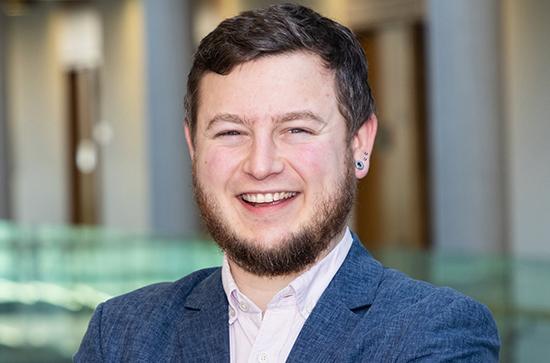Dr Ian Marder and AnnMarie Maher: How would you cope as a child with a parent in prison?

Dr Ian Marder
Criminology lecturer Dr Ian Marder and postgraduate student AnnMarie Maher of Maynooth University Department of Law consider the needs of children of imprisoned parents.
The children of imprisoned parents suffer some of the worst unintended harms caused by criminal justice systems. It is estimated that over two million children in Europe have an incarcerated parent at any one time, putting them at an elevated risk of trauma, physical and mental health issues, financial and residential instability, and social exclusion.
These children are the victims of a situation entirely beyond their control and not of their own making. Worse still, they exist largely under the radar, with few services able to meet their needs.
The tide, however, may be turning. From Canada and the United States, to the Netherlands and Denmark, researchers and activists increasingly study the adverse impact of parental imprisonment and advocate for children’s rights. Last year, the Council of Europe adopted a Recommendation concerning children of imprisoned parents, deliberately oriented around children’s rights. It states that children’s ‘best interests should be of primary consideration’ and promotes a whole-system approach, with contact between children and their parents, and multi-agency support for children on the outside, of comparable importance.
While the Recommendation has provided a much-needed boost to this work, many barriers remain to vindicating the rights of children of imprisoned parents.
The first barrier is often the hidden nature of the problem. The Recommendation states that European prison administrations should collect information about dependent children (Rule 5), but most do not do so systematically. In Ireland, the Irish Penal Reform Trust (IPRT) has estimated that parental imprisonment affects around 6,000 children at any one time, noting that there is much more we need to learn about their characteristics and needs. The Irish Prison Service now record some of these data upon each person’s arrival into custody, although these are not yet published.
Another barrier is social stigma. The children of imprisoned parents are commonly excluded from their community because of the fear, shame and suspicion accompanying parental imprisonment. Their isolation and degradation mirrors that experienced by their imprisoned parents, a form of what Megan Comfort calls ‘secondary prisonisation’. Every time the fallacy of the evil, pathological and undeserving prisoner is reinforced, it becomes harder for the families of people in custody to participate fully in society.
Finally, there is the problem of resources. As well as timely access to traditional services, these children may need dedicated assistance to support their relationship with their parent on the inside and help cope with the disruption to their life on the outside. The BBC recently reported that, of the 17,000 children in England and Wales whose mothers were imprisoned in 2017, 95% had to move from their home as a result, illustrating their potentially urgent and acute needs. Yet, in most countries, dedicated services remain chronically underfunded or non-existent, and successful projects are not always rolled out. The resulting postcode lottery of services means that children are discriminated against based on where they live.
This brings us to Ireland. Article 42A of our Constitution pronounces that all children possess ‘natural and imprescriptible rights’ and outlines the State’s responsibility to guarantee their protection. But Ireland, too, lacks a comprehensive approach to supporting this particularly vulnerable group.
Recent years have seen a welcome emphasis on improving prison visiting conditions for children. The Irish Prison Service is rolling out its Family Links programme, following a successful pilot which focused on improving visits, parenting education, and staff training and awareness. In 2014, the Department of Children and Youth Affairs also committed to promoting child-friendly visiting arrangements.
Still, the availability of enhanced visiting areas is contingent on prisons having the resources to operate them and is far from the only way to support parent-child relationships. The IPRT, while lauding recent developments, reminds us that we are yet to reach the standards set by the Council of Europe.
The focus on in-prison actions alone cannot fully address the disruption children face on the outside. For this, Ireland could establish a national organisation, like For Fangers Pårørende (Norway) or Families Outside (Scotland), providing dedicated support to the families of people in custody.
Ireland might also benefit from an inter-agency strategy to promote data collection and information sharing, create new mechanisms for children’s voices to be heard, and ensure that children do not fall through cracks in the system. A holistic approach requires the involvement of health, education, housing and social welfare services, among others.
These possibilities should be considered by the Families and Imprisonment Group which, as the Minister for Justice and Equality recently announced, is now exploring ‘best practice in community support and resettlement for families with an imprisoned parent’.
Finally, as we better understand the role of family relationships in desistance, and the behavioural, psychological and neurological impact of trauma, these considerations must be communicated to judges and factored into penal policy. The harms imprisonment causes to family life are among the many reasons why prison should be a sentence of last resort, with community-based alternatives prioritised as much as possible.
Given the importance placed on the family in Ireland, the unwarranted suffering of these children should give pause for thought to those who support ever harsher sentencing.
- Dr Ian Marder is a lecturer in criminology at the Department of Law at Maynooth University. AnnMarie Maher holds an LLB in Law and is beginning an MA in Comparative Criminology and Criminal Justice in September 2019 at Maynooth University. This article first appeared on RTÉ Brainstorm.








